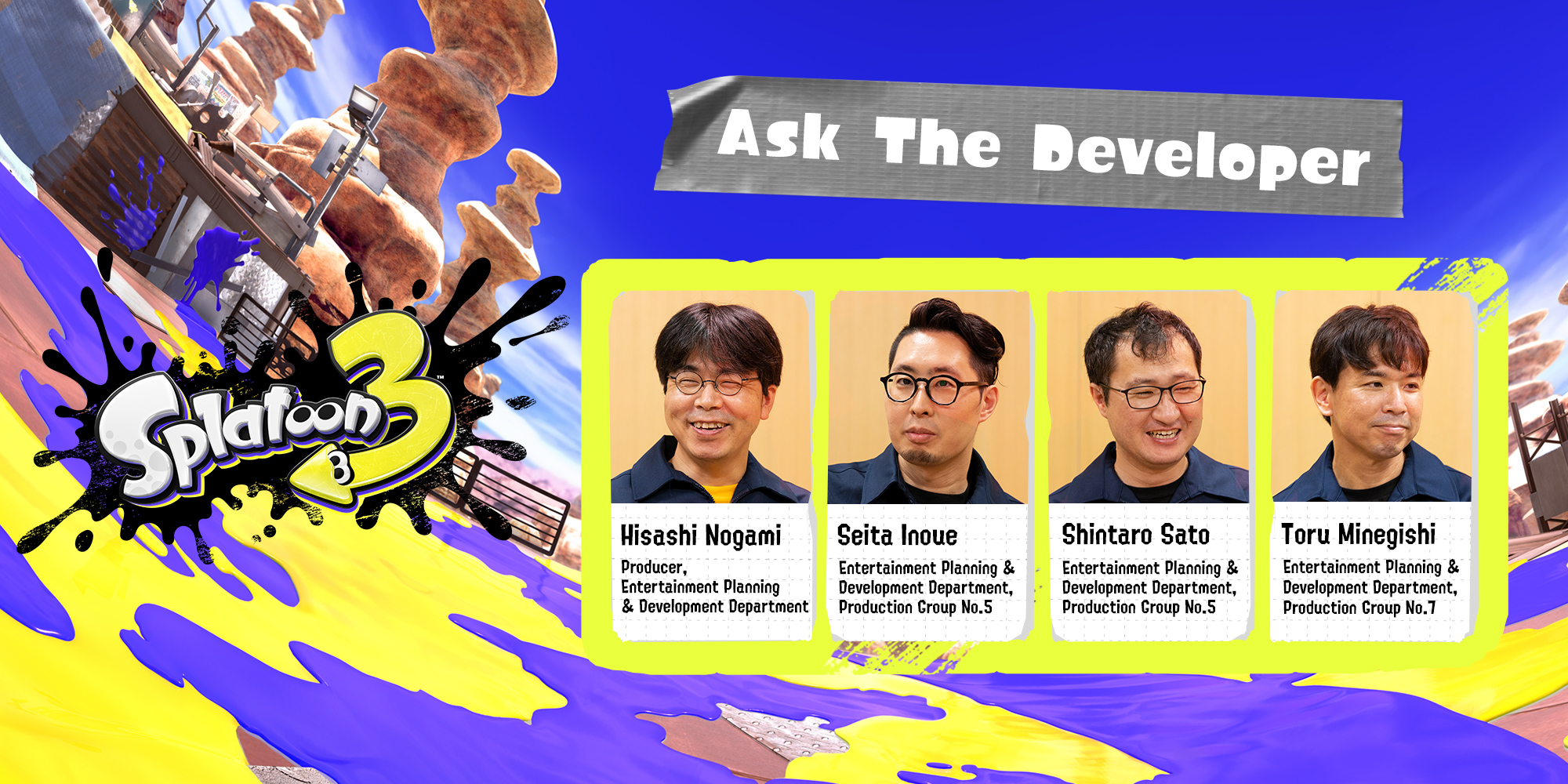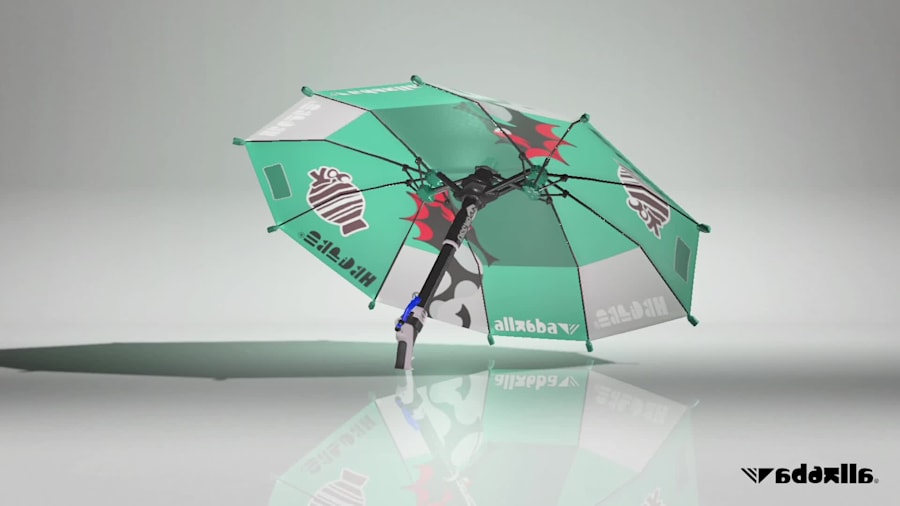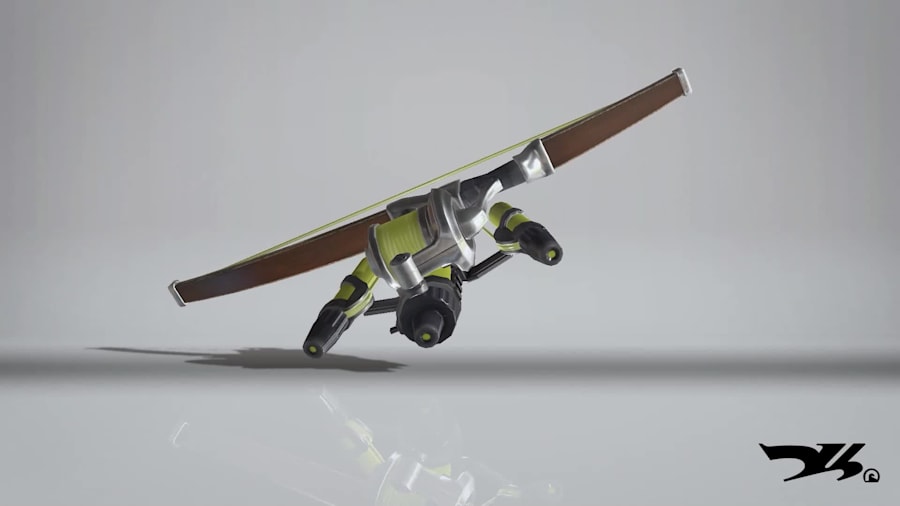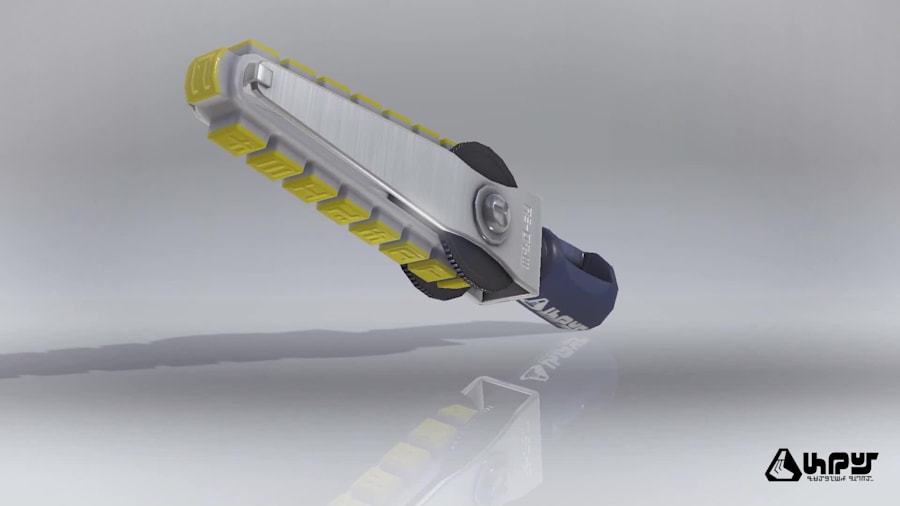Ask the Developer Vol. 7, Splatoon 3 – Chapter 2
07/09/2022

Content pre-recorded in accordance with current COVID-19 health and safety guidelines.
This article has been translated from the original Japanese content.
Chapter 2: Incorporating each developer's strengths into the game
So far, we have asked you about how the world of Splatoon was created. You mentioned that you place great importance on portraying a world that seems real, but where do you get your ideas for the "weapons" and "gear" that appear in the game?
Inoue:
Weapons in this game are sometimes inspired by items we used to play with growing up. For example, the Splat Brella weapon (shown below) was inspired by my childhood memories of play-fighting with umbrellas.
Another good example is stationery. When I was in elementary school, some kids had very elaborate and high-tech-looking pencil cases that were popular in Japan, and I was envious of them. A weapon, Triple Inkstrike, was inspired by these pencil cases.
Of course, some of the weapons were created because we simply thought it would be cool to have something like them.
In this title, we have a weapon class called the Stringer (shown above), which was inspired by a fishing rod. We designed it to look like a Splatoon weapon, without making it look like a firearm.
There are new weapons called Splatanas. One of these, the Splatana Stamper (shown above), was inspired by a date stamp (3) provided by Nintendo when we joined.
(3) A useful device used in Japan for stamping a date, name and department name on a document all at once. The year, month, and date can be adjusted manually by dialing the numbers. It is used instead of a signature to review documents.
Nogami:
Of course, we created a background story within the Inkling world for each of these weapons.
For example, consumer electronics and art supply manufacturers of the Inkling world have joined in the weapon manufacturing business. However, since the Turf War battle trend has gained popularity, even the fishing equipment manufacturers have decided to join the Turf War battle industry in Splatoon 3. (Laughs)
The impact of Turf War battles in the Inkling world continues to grow throughout the series. In the first title, the Turf War battles were just a trend among some Inklings. However, in the third title, it is positioned more like a sport that residents in the Inkling world have been familiar with since childhood.
It's like how people in Latin America feel about football.
So you filled the Inkling world with background stories that seem real and are inspired from your personal experiences. By the way, players each have a place where they can display all kinds of weapons this time. Could you tell us more about it?
Inoue:
You're referring to lockers, a new feature added in this title.
As Nogami-san mentioned earlier, Turf War battles are considered a sport in the Inkling world. So, we thought it would be realistic and interesting if each player had their own locker and could decorate it as they liked by arranging their weapons and items.
Looking back on my high school days, I remember the passing moments I spent in front of lockers during breaks more than the time I spent studying in class.

Nogami:
The inside of a locker can tell you a lot about the person who owns it.
Inoue:
I agree. A person in a baseball team might have a baseball bat in their locker. Someone who loves to read might have many books.
We wanted to recreate in this world the idea that the contents of a locker represent the owner themselves, so we've made it possible for players to arrange their favourite weapons and items that they've collected in the game however they like.

Some people might leave their locker a mess, while others may keep things neat and tidy… I'm sure the lockers will represent the unique personality of each player.
Nogami:
I think the same is true for office desks. (Laughs)
You can also see what's inside other players' lockers, and I thought this would be interesting because you get an idea of what kind of person the owner is by seeing their locker. For instance, if you see shoeboxes of various brands in the locker, you would think that this person must really love trainers.

Sato:
We also have figurines of fictional superheroes of the Inkling world. We have an extensive collection of items that are very enticing for players to collect.
In previous Splatoon titles, we didn't place much importance on features not directly related to battles – instead, importance was placed on different ways to battle. Because of this, I feel like the ultimate goal for many players was just to become very good at battling.
In this title, we didn't want that to be the only reason to play the game. We also wanted players to feel that they want to play battles again because they can get items and collect more. I think we were able to provide more ways for players to enjoy this game.
Nogami:
Besides lockers, there are other new features where players can enjoy collecting items. A good example is the card game, Tableturf Battle. You can collect cards in many different ways, and you can play a card game using them.
Splatoon is an action shooter, right? But you can also play a card game?
Nogami:
Yes. Cards are fun just to collect, right? (Laughs)
I was really into collecting cards as a child, but in this game, cards are not only for collecting. They can also be used in Tableturf Battle to play games.
Inoue:
Card games have recently gained a lot of popularity in the Inkling world. We thought this kind of hobby feature would make the world depicted in this game more convincing.
The cards were all drawn by members of the development team, who are good at drawing this type of illustration. I like chibi character designs because they were popular in my generation, and we thought cards used for card games often had this kind of design.

Sato:
I believe that players will also feel nostalgia when they see this kind of homage to things we were all obsessed with as children.
Hearing these stories about the design of the weapons, lockers, and card games, might bring back nostalgic memories. Are the personal experiences of the developers also reflected in the music?
Minegishi:
Yes. The music I listened to at a young and emotionally sensitive age, and how I listened to it, may be reflected in the music of the Inkling world.
For example, if you fall in love with a certain band, you might research and listen to their old songs. Or, you might get excited imagining what their next single will sound like!
If that band you liked were to go on hiatus suddenly, you'd probably feel quite sad about it. But those band members may go on to start solo projects or form another band with an unexpected artist. You might even become more interested in this new artist than the band member you were previously a fan of.
Yes, I feel that such stories are not uncommon.
Minegishi:
Actually, these things also happen in the Inkling world.
The main band in the first title, Squid Squad, has gone on hiatus, but its members, except one, form a new band called Front Roe in this title. Some players who know the music of the old band might be able to tell who they are right away after listening to their current music.

I see. Some band fans want to follow not only the band's music itself but also things surrounding the band, including its roots and the relationships among the members.
Minegishi:
Exactly. And when you see your favourite band releasing an album for the first time in five years, that alone makes you happy and scream "Wow!", right? (Laughs)
Yes, that's true. (Laughs)
Am I right to assume that you share this kind of background setting with the people in charge of composing when creating music?
Minegishi:
Yes. For example, a person in charge of composing who we thought would enjoy creating the heavy and wild music of C-Side wrote the songs of C-Side. On the other hand, different personnel who we thought would convey the characteristics of other bands well wrote the music for other bands.
When multiple people work together to compose songs, we usually try to blend them so that each person's music tastes doesn't come out too much. Considering the band structure and background story, each person in charge of composing is assigned tasks that make the most of their talent and uniqueness when writing songs.
Nogami:
The characteristics of the designers are also reflected a lot in the gear.
Sato:
Normally, you would have an idea of what you want to create in a game and then look for people with the skills to create it. However, in Splatoon, we often try to maximise the strengths of development staff, like "OK, this person is good at this, so let's incorporate their strengths into the game".
Inoue:
I think something like this happens in both the real and Inkling worlds. I think those who love shoes would probably be better suited to be shoemakers, and those who love clothes would make clothes. Good designs and sounds are created because there are people who are good at what they do and enjoy it.
So that is how you leverage the developers' backgrounds.
Minegishi:
Yes. The sound staff also oozes out the influences from music that they usually listen to, along with their favourite sound texture and melody transitions, even if their expressions aren't intentional.
Nogami:
I believe that each person's personal experiences, happy memories from childhood, hobbies and skills lead to the variety of elements contained in the series.
Sato:
Many developers seemed to have been worried about whether it was really okay for them to take so much liberty and incorporate their personal taste, but I gave them a push saying, "Don't worry, just be yourself"! (Laughs)
Inoue:
The directors then had to think carefully about combining and presenting these various elements into a single game.
For the game's music, we created album covers to convey each band's image. We also decided to present a wide variety of gear using a catalog. We tried to present the items born from various people's ideas in a digestible, organised, and enjoyable way so that they are not presented in a completely unorganised manner.
I think this process is comparable to editing a magazine.
Nogami:
That said, what we depict in the game is only a tiny part of the Inkling world. What we don't see in the game is left to players' imaginations.
We developers also imagine and think about many aspects that cannot be seen on the game screen. However, if we include all our ideas, there will be no room for imagination in the future, so we always spend time deciding how much we incorporate our ideas into the current Inkling world.
Sato:
We believe players are passionately studying the Inkling world. But actually, we, the developers, are also still in the middle of our own research. (Laughs)






